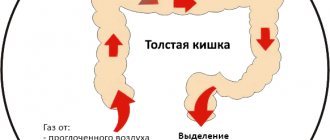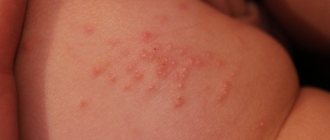Diarrhea during pregnancy: possible causes
- The first trimester of pregnancy is characterized by changes in the functioning of the digestive system. There is a change in taste, “whims” in food intake appear, nausea and vomiting often occur - all these are signs of toxicosis. With changes in diet or the appearance of unusual foods on the menu, relaxation and increased bowel movements may occur. If there are no spastic pains, impurities in the form of mucus or blood, feces in the usual volume or a little more, it may be enough to adjust the diet. The stool returns to normal without treatment.
- Often in the early stages of pregnancy, medicinal forms of vitamins and microelements are prescribed, and for concomitant diseases, women take certain medications as prescribed by a doctor. Many medications can cause diarrhea during pregnancy: Magnesium-B6, other multivitamin and mineral supplements, folic acid.
- During the second trimester, a pregnant woman's body is prone to insufficient digestion of food, which can lead to diarrhea.
- During late pregnancy, a woman’s body experiences increased production of prostaglandin hormones, which leads to bowel cleansing, a necessary process that precedes childbirth. In this case, diarrhea begins almost before contractions.
- As the uterus grows, the load on the entire gastrointestinal tract increases, the organs of which are compressed and displaced, which can lead to disruption of the process of complete digestion of food. Frequent diarrhea may occur, especially if the pregnant woman already has gastroenterological diseases.
- The entry of various microorganisms into the body of a pregnant woman can cause serious illness. Intestinal infections, food poisoning, and parasitic diseases occur with very serious symptoms. They are accompanied by diarrhea and vomiting, high body temperature, signs of dehydration, severe weakness, and severe abdominal pain.
- The presence of diseases of the endocrine system in a pregnant woman - diabetes mellitus, Addison's disease, thyrotoxicosis, adrenal insufficiency - can cause hormonal imbalance, accompanied by diarrhea.
- Reactions of a neurogenic nature (the so-called “bear disease”).
The age-old question
Diarrhea in pregnant women is not such a rare occurrence; in the early stages (up to 11-13 weeks) toxicosis is tormented, more often it is associated with nausea and food aversion, but indigestion can also occur. Therefore, before you panic and frantically search for medications, you need to go through all the reasons that could provoke diarrhea. Without the knowledge of the doctor, you should not carry out treatment on your own, this is especially dangerous in the early stages, when all the vital organs are being formed and the future little person is being formed. In most cases, diet helps with diarrhea.
If you have diarrhea, you need to drink more water, although at 21-22 and 31-34 weeks, when the belly is already large, many women are afraid of excessive fluid intake due to edema. With water, decay products and pathogenic microorganisms that cause the development of diarrhea are washed out of the intestines.
What you can drink for diarrhea: compotes, herbal decoctions, clean water. Any carbonated drinks and store-bought juices are not recommended, even if the package says “for baby food.” Many unscrupulous manufacturers add preservatives, essences and thirst-increasing substances to supposedly natural juice. The latter are especially dangerous, as they further worsen dehydration.
In the early and late stages of pregnancy, diarrhea can be treated with Smecta and Regidron. Smecta helps stop diarrhea and removes toxins, Regidron solution restores water and electrolyte balance and prevents excessive loss of water by the body.
Diarrhea during pregnancy, if it is not burdened by infectious factors, can be treated with folk remedies. Decoctions and infusions will be effective at both 17 and 28-30 weeks, the main thing is to avoid alcohol-based products:
- The starch solution is absolutely not dangerous; add a teaspoon of powder to a glass of warm water and drink.
- At any time, a decoction of pomegranate peel strengthens, it can be drunk separately or added to tea.
- Blackberry leaf and walnut leaf can be brewed for diarrhea in pregnant women. The decoction has an astringent and strengthening effect.
- Both in the early stages, and at 23-25 weeks, as well as at the end of pregnancy, many women are on the verge of stress; the doctor will tell you why this happens; most often this is a consequence of “raging hormones,” but it is also possible that external stimuli act. Stress and nervous tension are common causes of diarrhea, so along with fixatives, you can drink mint tea or motherwort tablets in the morning.
- It is necessary to take the popular drug Loperamide with caution, despite the fact that it is not prohibited during pregnancy. It is important to follow the dosage; excessive amounts of the drug can cause constipation.
Diarrhea during pregnancy in most cases is eliminated using gentle methods; treatment should be prescribed by a doctor, since the reason for the prescription is always based. In the absence of pathogenic factors, diet helps. Diarrhea is a symptom of some pathological condition, especially if diarrhea is accompanied by vomiting, fever and nausea, and even more so if the stomach hurts. What to do? A specialist should be called immediately; for a pregnant woman, such a condition is extremely dangerous and serious treatment is necessary.
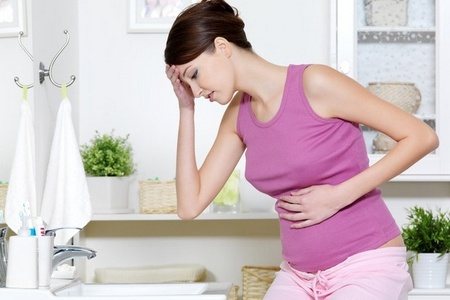
Is diarrhea dangerous during pregnancy?
Under some conditions, diarrhea in pregnant women can become a dangerous condition, even life-threatening - both for the unborn child and for the mother. Symptoms for which you should seek medical help:
- prolonged course of diarrhea without spastic pain, but without a tendency to consolidate stool;
- frequent (more than 3 times a day) and heavy stools for more than 1 day;
- admixture of mucus, blood or other inclusions in the stool;
- accompanying nausea, vomiting;
- loss of appetite up to refusal to eat food and water;
- spasmodic abdominal pain;
- increased body temperature;
- general weakness, malaise;
- headache and muscle pain.
If there is at least one of the listed symptoms, there is a danger of dehydration of the woman’s body and deterioration in the condition of the fetus. In this case, the pregnant woman needs immediate medical care aimed at restoring water and electrolyte balance. In the absence of these symptoms and diarrhea that appears after eating, the pregnant woman’s diet should be adjusted to avoid loss of beneficial nutrients.
Treatment of diarrhea
Treatment of diarrhea in pregnant women should be carried out under the supervision of a specialist. It is highly undesirable to take medications that have a temporary effect on your own. Most of them are harmful to the unborn child. Medicines for pregnant women for diarrhea should be recommended by a doctor. Then they will successfully relieve unpleasant symptoms and maintain the woman’s health without causing damage.
We recommend: Main causes of diarrhea at 39 weeks of pregnancy
If pregnant women experience loose stools, it is better to use traditional methods against diarrhea. The majority of these recipes are completely harmless.
Traditional methods against illness
When a pregnant woman has diarrhea, the doctor will tell you what to do. In some cases, it is enough to use a simple diet described in the table.
| Prohibited foods (observe for 1 day only): | Milk, kefir, whey, fried, fatty, salty, sour. |
| Authorized products: | Rice and oatmeal porridge, apples, carrots, yoghurts. |
| Recommended food temperature: | Only at room temperature. |
| Recommended drink: | Herbal decoctions, compotes of fresh berries, infusions of mint and lemon balm. |
When deciding what to do if you have diarrhea, you can cook rice porridge. Once in the body, it will help strengthen the intestines and absorb toxic substances, relieving diarrhea.
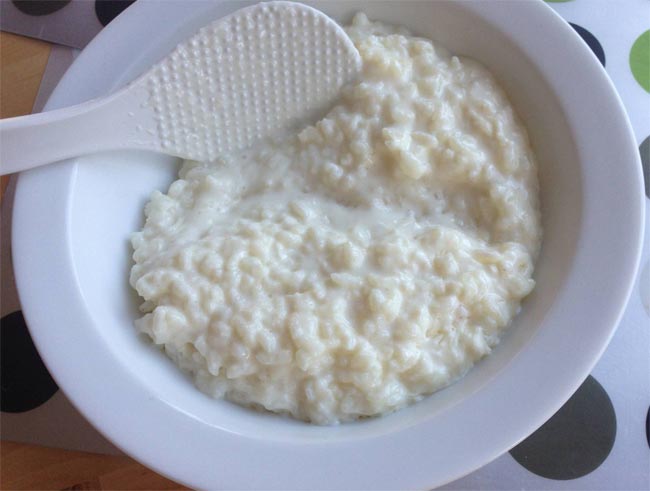
Baked pear relieves intestinal upset. The infusion is no less effective. Finely chop the pear and pour boiling water over it. The composition is infused or boiled over low heat for 20 minutes. To relieve diarrhea, the drug should be taken on an empty stomach in small portions.
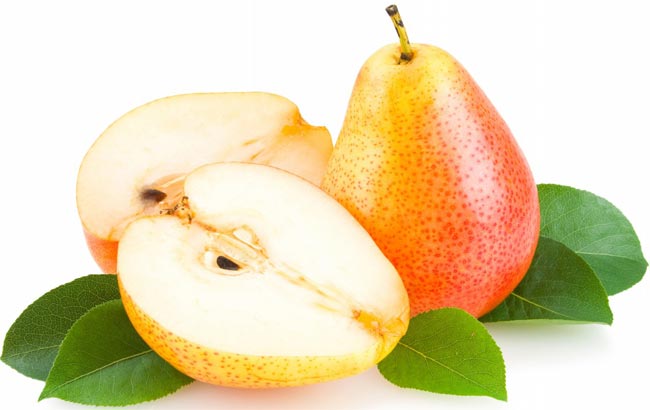
An infusion of pomegranate peel is effective. The crust must be peeled and washed in warm water. The peel should be cut and placed in a half-liter container. Pour two cups of boiling water. Let it brew for 3 hours. The composition is taken 70–80 ml three times a day before meals.

Medicines for diarrhea
It happens that to relieve the symptoms of severe diarrhea you have to take chemical tablets. Doctors allow this method of treatment no earlier than 35 weeks of pregnancy. In this case, accept:
- Loperamide.
- Nifuroxadide.

These medications stop diarrhea. To restore the water-salt balance, solutions of “Regidron” or “Gudron” are recommended.
During diarrhea, it is vital to drink as much water as possible. It is worth drinking decoctions of medicinal herbs. Before choosing a composition, it is better to consult a doctor. We recommend watching a video about stomach disorders.
If, when symptoms of diarrhea occur, you respond to them promptly and competently, you can really avoid dangerous consequences for the mother and unborn child. If severe diarrhea develops, it is better to immediately call an ambulance. Doctors will be able to provide quality care in any situation.
Diarrhea in early pregnancy
In the very early stages, nausea and vomiting often occur, which may indicate toxicosis in the first half of pregnancy. If these symptoms are accompanied by diarrhea, this is most likely a sign of either an error in the diet, or a chronic or (which is much more dangerous) infectious disease of the gastrointestinal tract.
However, can diarrhea be a sign of pregnancy? Sometimes - yes, it can be one of the dubious signs in the triad: vomiting, nausea and diarrhea. Although there is no need to talk about the reliability of such a sign, a hormonal transformation occurs in the body of a pregnant woman, which can cause the above-mentioned disturbances in the functioning of the digestive system.
What can you eat and drink?
On the first day of acute diarrhea, if possible, you should refrain from the usual first and second courses. You should drink plenty of fluids to replenish your body's water balance. You can drink: black tea, compote of blueberries, viburnum, dried pears without sugar, as well as rice water. From solid products - white bread croutons. In the evening, if you feel very hungry, you can eat a quarter of a portion of boiled rice in a mushy form.
For the second day, slimy soups and water-based porridges made from rice and oatmeal are recommended. Bread – in crackers or dried, you can use diet bread. To drink – tea, compotes, fruit drinks, pomegranate decoction, still mineral water. Vegetable broths and low-fat chicken broth are allowed. Fresh fermented milk products - kefir, fermented baked milk, yogurt (in an amount of no more than 150 ml per dose) - will help the intestines work.
From the third day you can eat stewed vegetables, steamed minced meat dishes, and soups made with low-fat light broths. All food should be neither cold nor hot. You should stick to this diet for about a week. In the future, you can smoothly switch to your usual diet.
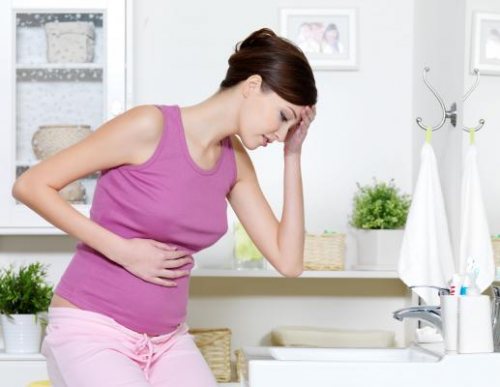
Treatment
Medicines are prescribed only for pronounced symptoms. If indigestion does not cause severe concern, then following a diet and drinking regime is sufficient.
Therapeutic nutrition must be balanced. Eating frequently, but in small portions. Proteins should predominate in the diet, and the intake of fats and carbohydrates should be reduced. Fried and fatty foods, smoked and salty foods, marinades and spices, and other products that have a choleretic effect and irritate the intestinal tract are removed from the menu.
The menu should include:
- fresh oatmeal or rice porridge with water;
- vegetable, cereal, pasta soups without fat;
- steamed cutlets and meatballs from lean meat or fish;
- fermented milk products (yogurts rich in bifidobacteria are especially recommended);
- boiled or steamed vegetable dishes;
- fruits and berries (apples, bananas, pears, blueberries are healthy).
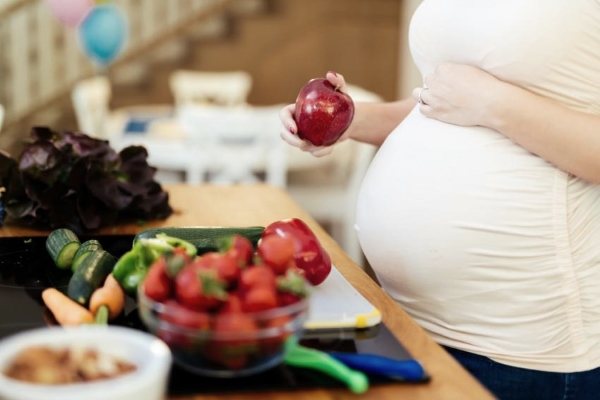
During treatment, you need to drink enough liquid, but not in excess, otherwise swelling and increased blood pressure may occur. The optimal amount to drink is 100 ml per hour. It is recommended to drink water, berry jelly and fruit drinks, tea (black or herbal), fresh squeezed juices, and milk drinks. Chamomile, mint, sage, lemon balm, and St. John's wort are suitable for making herbal tea.
To improve well-being, stimulate metabolism and normalize the emotional state disturbed by the pathological process, daily long walks in the fresh air are useful.
Diarrhea in the third trimester of pregnancy
During the entire third trimester, diarrhea is most common. If diarrhea begins two weeks before your due date, it may be a sign that your body is preparing for the birth process. If diarrhea occurs before the 36th week of pregnancy, this may be a sign of the onset of premature labor. Therefore, it is important to pay attention when diarrhea lasts longer than a day and is accompanied by one or more symptoms:
- abdominal pain of any nature;
- increased body temperature;
- the presence of blood or mucus in the stool;
- dizziness, weakness, dry mouth (symptoms of dehydration);
- decrease in fetal motor activity;
- vaginal discharge.
An ambulance should be called immediately, as the woman needs hospitalization for urgent treatment.
At 37, 38, and even more likely - at 39 - 40 weeks of pregnancy, diarrhea can exclusively be a harbinger of labor. If the above pathological symptoms are not observed, most likely this is so. However, the risk of poisoning or intestinal infection remains, so you should always consult a doctor.
Diarrhea at 27 weeks of pregnancy
Each of us has encountered diarrhea in our lives, more than once. The reasons for its occurrence can be very different. But there are general principles and approaches to its treatment, or rather to the elimination of unpleasant symptoms, and therapeutic methods depend on the nature of the pathology and the individual characteristics of the body.
Particular attention should be paid to such a fairly common phenomenon as diarrhea during pregnancy. During pregnancy, a woman’s body undergoes enormous changes and experiences double stress, both on the physical and psychological levels.
In addition, during pregnancy, many medications are strictly contraindicated for use, as they can have a detrimental effect on the development of the fetus.
But what then should a woman do if she suddenly develops diarrhea? How to eliminate rather unpleasant and often painful symptoms, as well as how diarrhea affects the baby’s intrauterine development is the main topic of this article.
Why do pregnant women experience diarrhea?
Diarrhea is such a common pathology that its occurrence up to six times a year in a completely healthy person is considered normal. Since loose stools in this case are the body’s protective reaction to fatty foods, spoiled foods (thus the intestines remove toxins), viruses and infections.
Of course, if diarrhea occurs much more often and in an acute form, then we will be talking about more serious causes and disturbances in the functioning of the gastrointestinal tract. But now we will outline the reasons that are the main provoking factors of diarrhea during pregnancy.
Intestinal upset and loose stools caused by it are distinguished by the intensity of the symptoms:
- acute diarrhea, occurs after viruses and toxins enter the body, pronounced symptoms continue for two or three days;
- prolonged diarrhea – frequent trips to the toilet and loose stools can last up to two weeks;
- Chronic diarrhea refers to an illness that has lasted for a month or more; by the way, this condition most often indicates serious illnesses.
The causes of loose stools during pregnancy can be so elementary that women, as a rule, do not associate them with stool disorders. For example, very often diarrhea in pregnant women can be caused by:
- heavy food;
- use of medications (as a side effect);
- gymnastics for pregnant women or light exercise;
- foods rich in fiber;
- vitamins;
- irritability, short temper, frequent mood swings in a woman;
- toxicosis (diarrhea acts as a concomitant symptom).
But most specialists in the field of reproductive gynecology attribute diarrhea in late pregnancy to the natural preparatory stage of the body for childbirth.
Clinical picture of diarrhea during pregnancy
A pregnant woman is very susceptible and vulnerable. Any change in her condition causes her anxiety and concern. As for diarrhea, it can occur at any time.
It bothers many at the beginning of pregnancy, and is associated with changes in the body; for others, it appears in the last trimester. But it is possible that it will appear at any time during the important nine months of gestation.
It is important to understand that loose stools are not a disease, it is only a symptom indicating that problems have arisen in the body and they need to be seen, understood and eliminated.
Intestinal upset in a pregnant woman is accompanied by a number of accompanying symptoms, these are:
- nausea;
- fever;
- bloating and gurgling in the abdomen;
- uncomfortable and painful condition;
- increased body temperature;
- dizziness;
- headache;
- weakness;
- feeling unwell, because during diarrhea the body loses a huge amount of water.
You should also pay attention to the presence of mucus and blood clots in the stool and their color. If the feces are almost black in color, this may indicate stomach problems, in particular an ulcer.
But regardless of the symptoms that accompany diarrhea, its occurrence is already a reason to consult a doctor for advice and determine the cause that triggered the appearance of loose stools.
The danger of diarrhea in early pregnancy
Diarrhea that occurs in the first trimester poses a serious threat to both the woman and the fetus. When diarrhea is caused by pathogenic bacteria or viruses, they also threaten the unborn child, since at this time they can quite easily pass through the placental barrier and harm the fetus.
Diarrhea in the first month of pregnancy causes enormous harm to the female body, as it quickly leads to dehydration and intoxication, and also interferes with the absorption of vitamins. In addition, with diarrhea, spontaneous contractions of the uterus occur, and this naturally can provoke a miscarriage or affect the development of the fetus.
Dehydration of the body is dangerous in any situation, and even more so during pregnancy, so a woman must be very careful, because she is responsible not only for herself, but also for her baby. If you have diarrhea, you should pay attention to the following symptoms:
- constant feeling of thirst;
- dry mouth;
- dark color of urine;
- high body temperature;
- dizziness;
- "floaters" before the eyes.
As soon as they appear, you must immediately seek qualified help from doctors, because dehydration causes intoxication, which is dangerous for both the woman and the child, and lost time can even lead to death.
In the early stages, diarrhea can occur as a reaction of the body to toxicosis. In this case, you should still be under the supervision of a doctor and carefully monitor your condition.
Diarrhea at 30 weeks of pregnancy
In this case, we are not talking about loose stools, which are caused by eating heavy foods or viruses. We are talking about diarrhea that develops together with late toxicosis.
At the thirtieth week, a woman may feel general weakness, dizziness, nausea, and loose stools appear. This is a critical phase of pregnancy and very dangerous.
The fact is that diarrhea at this stage provokes active contractions of the uterus, and this can cause premature birth. But children born at the thirtieth week are not viable; they, as a rule, die.
And of course, dehydration is dangerous at any time; in this case, a lack of water and salts in a woman’s body can provoke the appearance of thrombosis.
Late dates
As noted above, diarrhea in the later stages can be a natural process in preparing the body for childbirth, we are talking about the period from the thirty-fifth to the fortieth week.
However, it should be noted that diarrhea from the thirty-fifth to the thirty-seventh week is not a very desirable process, since the baby is born premature and weak, and therefore needs special medical supervision and care. Therefore, at this time you need to be very attentive to yourself. A woman should not provoke this process through her actions. You should protect yourself as much as possible from possible viruses, from low-quality food, etc.
But at this stage, diarrhea can be caused by the child himself. When the fetus is quite large, it puts pressure on the internal organs, which can result in intestinal problems. Loose stools, in addition to premature birth, are also dangerous because dehydration may occur.
Regarding diarrhea, which occurs starting from the thirty-eighth week, if it is also accompanied by cramping pain, then most likely these are prerequisites for the onset of labor. In this case, there is no danger in loose stools.
But if diarrhea at this stage is caused by poisoning, then the doctor prescribes medications to not only eliminate the symptoms and alleviate the woman’s condition, but also to prevent toxic substances from reaching the fetus.
How to deal with diarrhea during pregnancy
Treatment of diarrhea during pregnancy should only be carried out as prescribed by a doctor and under his supervision. After all, many medications pose a huge danger to the development of the fetus.
Therefore, a woman who is faced with this problem should not self-medicate.
Only a doctor can determine the cause of the disease and prescribe adequate treatment, which is indicated at a particular stage of pregnancy.
General recommendations for diarrhea are to drink plenty of fluids and eat a diet. It is necessary to completely exclude dairy products and fried, spicy, sour, salty foods.
This should be done to normalize the gastrointestinal tract. On the second day, you need to eat only liquid oatmeal and rice, cooked in water, but without salt or sugar. You can also eat crackers, biscuits and drink strong tea.
Herbal teas made from chamomile, mint, and lemon balm are also useful for diarrhea.
It is not recommended to take medications to combat diarrhea until the thirtieth week, after which, in consultation with your doctor, you can be treated with: smecta, activated carbon, loperamide, nifuroxazide, etc.
There are a number of folk remedies to combat diarrhea. But they can only be used after consultation with your doctor. Jelly made from fresh or frozen lingonberries or cranberries is considered quite effective.
It's easy to prepare. Half a glass of berries is washed, then poured into a glass of boiling water and kneaded well. The resulting pulp is passed through a sieve, a little starch is added to the resulting syrup and the jelly is boiled.
Afterwards you can add honey to it.
It is also often recommended to treat diarrhea with pomegranate peel during pregnancy. It should be washed and poured with boiling water (500 ml), covered and allowed to brew for two hours. After the infusion, you should drink it in small portions throughout the day.
Source: https://detki.shukshin-net.ru/ponos-na-27-nedele-beremennosti/
How to treat diarrhea during pregnancy?
To restore normal functioning of the digestive system, the following are prescribed:
- adsorbent preparations – Smecta, Activated carbon, Enterosgel, Polyphepan;
- enzymes – Pancreatin, Mezim-forte, Creon.
To replenish the loss of fluid and salts, saline solutions are used: Regidron, Gidrovit, Normohydron.
After 35 weeks, to stop diarrhea, it is permissible to prescribe Loperamide (or its analogues - Imodium, Lopedium, Diara, Entrobene). These drugs help avoid loss of large amounts of fluid and salts. However, their use is unacceptable for infectious diseases. In cases of intestinal infections, pregnant women are allowed to prescribe Nifuroxazide. After a course of treatment, to restore the intestinal microflora, it is possible to prescribe probiotic drugs: Bifidumbacterin, Bifiform, Linex, Baktisubtil.


